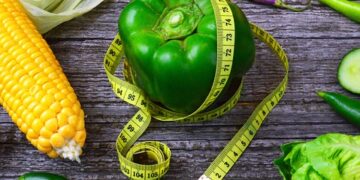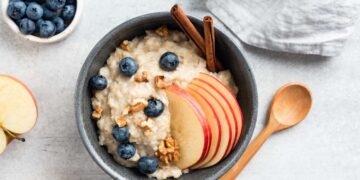Optimizing Nutritional Wellness: The Essential Guide to a Healthy Diet and Lifestyle
In today’s fast-paced world, it’s more important than ever to prioritize our health and well-being. One of the key components of maintaining a healthy lifestyle is ensuring that we are consuming a balanced and nutritious diet. Proper nutrition not only fuels our bodies with the necessary nutrients and energy it needs to function optimally but also plays a crucial role in preventing chronic diseases and promoting overall well-being.
In this comprehensive guide, we will explore the essential components of a healthy diet and lifestyle, as well as provide practical tips and strategies for optimizing your nutritional wellness.
A Balanced Diet: The Foundation of Health
A balanced diet is the cornerstone of a healthy lifestyle. It is essential to consume a variety of foods from all the food groups to ensure that our bodies are getting the necessary nutrients they need to function properly. A balanced diet typically consists of fruits and vegetables, whole grains, lean proteins, and healthy fats.
Fruits and vegetables are rich in vitamins, minerals, and antioxidants that help protect our bodies from diseases and promote overall health. Aim to fill half of your plate with fruits and vegetables at each meal to ensure you are getting an adequate amount of these essential nutrients.
Whole grains, such as brown rice, quinoa, and whole-grain bread, are an excellent source of fiber, vitamins, and minerals. They also help regulate blood sugar levels and promote a healthy digestive system.
Lean proteins, such as poultry, fish, beans, and legumes, are essential for building and repairing tissues in the body. They are also rich in essential amino acids that our bodies cannot produce on their own.
Healthy fats, such as avocados, nuts, seeds, and olive oil, are crucial for brain function, hormone production, and cellular health. While fats should be consumed in moderation, it is important to include them in your diet to maintain overall health.
In addition to consuming a balanced diet, it is also important to stay hydrated by drinking plenty of water throughout the day. Water helps regulate body temperature, transport nutrients in the body, and flush out toxins.
Practical Tips for Optimizing Your Nutritional Wellness
Incorporating healthy eating habits into your daily routine can be challenging, especially with busy schedules and tempting fast-food options. However, with some planning and preparation, it is possible to maintain a nutritious diet and lifestyle. Here are some practical tips for optimizing your nutritional wellness:
1. Plan your meals ahead of time: By taking the time to plan your meals for the week, you can ensure that you are making healthy choices and avoiding last-minute fast-food options. Consider meal prepping on the weekends to save time during the week.
2. Choose whole, unprocessed foods: Opt for whole foods, such as fruits, vegetables, whole grains, and lean proteins, over processed and packaged foods. Whole foods are rich in nutrients and contain fewer additives and preservatives.
3. Read food labels: When shopping for groceries, be sure to read the food labels to understand the ingredients and nutritional content of the products you are buying. Look for products that are low in added sugars, sodium, and unhealthy fats.
4. Practice mindful eating: Take the time to savor and enjoy your meals by eating slowly and paying attention to your hunger cues. Avoid distractions, such as watching TV or using your phone, while eating to prevent mindless overeating.
5. Listen to your body: Pay attention to how your body feels after eating certain foods. If you notice any adverse reactions, such as bloating or fatigue, consider eliminating or reducing those foods from your diet.
Common Questions About Nutritional Wellness
1. What are the key nutrients that should be included in a healthy diet?
A healthy diet should include a variety of nutrients, including vitamins, minerals, protein, carbohydrates, and fats. Key nutrients to include in your diet are:
– Fruits and vegetables: Rich in vitamins, minerals, and antioxidants
– Whole grains: A good source of fiber, vitamins, and minerals
– Lean proteins: Essential for building and repairing tissues
– Healthy fats: Crucial for brain function and cellular health
2. How can I ensure that I am getting all the necessary nutrients in my diet?
To ensure that you are getting all the necessary nutrients in your diet, focus on consuming a variety of foods from all the food groups. Aim to include different colors of fruits and vegetables, whole grains, lean proteins, and healthy fats in your meals. Consider taking a multivitamin or consulting with a registered dietitian if you are concerned about nutrient deficiencies.
3. How can I maintain a healthy diet while eating out?
Eating out can present challenges when trying to maintain a healthy diet, but it is possible to make nutritious choices. Look for menu options that are grilled, steamed, or baked rather than fried. Choose dishes that are rich in fruits, vegetables, and lean proteins, and ask for sauces and dressings on the side. Avoid sugary drinks and opt for water or unsweetened beverages instead.
In conclusion, optimizing nutritional wellness is essential for maintaining a healthy diet and lifestyle. By consuming a balanced diet rich in fruits, vegetables, whole grains, lean proteins, and healthy fats, you can fuel your body with the necessary nutrients it needs to function optimally. Planning your meals ahead of time, choosing whole, unprocessed foods, and practicing mindful eating are practical tips for optimizing your nutritional wellness. By incorporating these strategies into your daily routine, you can promote overall well-being and prevent chronic diseases. Remember to listen to your body and consult with a healthcare professional if you have any concerns about your nutritional wellness.














































